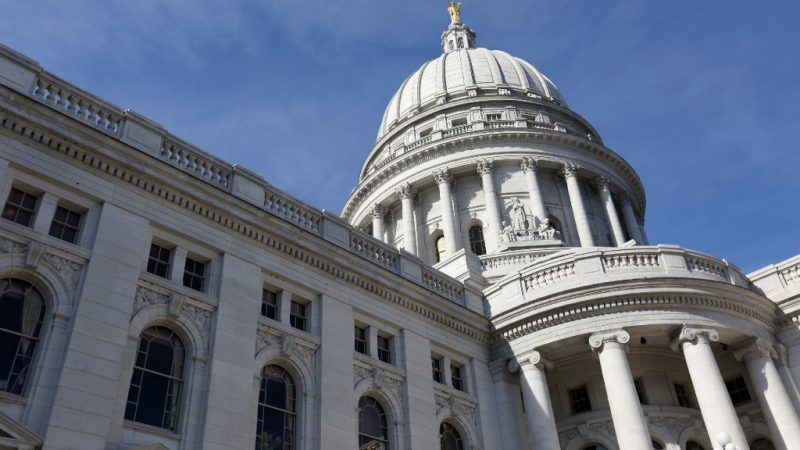Tony Evers and some of his fellow Midwestern Dem guvs didn’t hold back as they shared texts about the White House’s plans to end a National Guard deployment one day short of troops qualifying for federal benefits.
“Pathetic,” Evers called it in a text message to Govs. J.B. Pritzker, Tim Walz and Gretchen Whitmer.
“I hate these guys,” Walz wrote about the White House’s plan.
Along with bemoaning the White House’s plan — later abandoned — Evers and his Dem colleagues in Minnesota, Michigan and Illinois via text sought input from each other on how to deal with COVID-19, assistance to address violent protests and ideas on how to deal with a backlog processing unemployment claims.
>> WisPolitics is now on the State Affairs network. Get custom keyword notifications, bill tracking and all WisPolitics content. Get the app or access via desktop.
Transcripts of the texts WisPolitics.com obtained through an open records request offer a window into the thoughts of Midwestern chief executives as they consulted each other on a series of developments. That includes the news in mid-May that the Trump administration was planning a “hard stop” on the deployments of National Guard members who had been deployed in late March to help states deal with COVID-19. The planned order would have left many one day short of qualifying for early retirement and education benefits.
Pritzker, the Illinois guv, texted his three colleagues May 19 asking if they’d heard the news about the hard stop.
Walz, of Minnesota, wrote back he was “fighting it and made calls to leadership in Congress. Leaves troops 1 day short of benefits. I hate these guys.”
Evers then chimed in Wisconsin was working on it as well.
“Date was chosen to mess with the men and women who are serving Wisconsin during a pandemic. Pathetic,” Evers wrote.
During an August virtual breakfast with the Wisconsin delegation to the Democratic National Convention, Whitmer told state activists she had a text chain going with Evers and other guvs. She also joked with delegates that her colleagues wouldn’t be thrilled to know she had shared that nugget of information. WisPolitics.com then filed an open records request for the texts.
The messages show how the four shared ideas as they managed a pandemic and violent protests. Not all of the requests led to satisfactory answers. Evers at one point sought any “clever ideas from the great state of MN” on helping tourism reopen. Walz wrote back his resorts were struggling and the Mall of America was in “tough shape.”
Walz added, “This is just awful and normal seems so far off.”
The messages also showed:
*Evers asked his fellow guvs for help on addressing the UI backlog. Evers wrote in a June 22 text, “No need to answer this minute, but has anybody solved the UI issue-getting applications processed in a timely fashion, etc. it is a major issue here.”
Pritzker wrote back 48 minutes later, “Solved? No.” He added Illinois had hired Deloitte and added an outside call center, which wasn’t able to take individual case calls, only offer general guidance.
By that time, Evers had already announced contracts with vendors to open additional call centers to supplement state employees.
An Evers spokeswoman said none of the other guvs offered any other suggestions.
*One of the longest text chains in the records was from April 13 as the four discussed a regional approach to reopening their states.
Walz lamented being surrounded by Dakotas, Nebraska and Iowa, none of which signed on to the plan announced three days later. Pritzker, likewise, added Iowa, Indiana and Missouri were a problem for him. But Indiana ended up joining the effort that was announced April 16.
Whitmer first raised the idea before Pritzker sent a series of goals including: widespread testing with a quick turnaround, contacting those exposed to have them isolate, a therapy that reduces “symptoms, hospitalizations and deaths,” and personal protection equipment for the public, including masks that are effective and highly available “at low or no cost.”
Pritzker called them “the precursors for economic uplift.”
Nearly a month later, the Wisconsin state Supreme Court overturned Evers’ extended stay-at-home order, lifting state restrictions on businesses and the public.
*Whitmer texted Evers just after 5 a.m. Aug. 27 asking for a few minutes on the phone to discuss his request for the Michigan National Guard to assist Wisconsin. Violent protests began the night of Aug. 23 after a Kenosha police officer shot a Black man in the back as he was trying to get into a car. Evers sent in the Wisconsin National Guard the next day after receiving a request from local officials.
On Aug. 25, Evers turned down an offer from the White House to send Homeland Security agents to assist with the situation. Evers instead continued to increase the number of Wisconsin National Guard members deployed in the southeastern Wisconsin city and sought reinforcements from other states.
Whitmer wrote in her text she wanted to understand the mission and make sure her people did as well.
“I know we both are sensitive to the potential pitfalls associated with bringing the gaurd (sic) into these situations. We will help – just want to be clear re: MING role.”
The records didn’t include a text response from Evers to the message.
Meanwhile, Evers reached out to Walz at 10:45 p.m. May 28 as Minneapolis saw violent protests in the wake of George Floyd’s death. Evers told Walz, “if there is anything we can do, let me know. Kathy and I will be praying for you and your state.”
Walz wrote back 53 minutes later that he “may need your help.” Evers responded to keep him posted, and Walz quickly responded that he “Might need state patrol support.”
“Again, whatever you need,” Evers wrote back less than a minute later.
The state sent Wisconsin State Patrol officers to Minnesota to assist, an Evers spokeswoman said.




